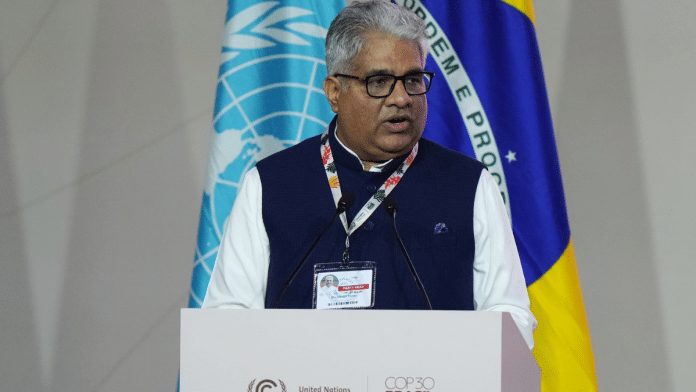Belém (Brazil): India on Monday called on developed nations to accelerate their net-zero targets, fulfil their obligations under the Paris Agreement and provide concessional finance to developing countries.
Delivering India’s national statement at United Nations Framework Convention on Climate Change’s (UNFCCC) Conference of Parties (COP-30), Union Environment Minister Bhupender Yadav outlined the country’s leadership in the fight against climate crisis.
Yadav told journalists on the sidelines of the Brazil summit that India will release its updated nationally determined contributions (NDCs) by December.
India and Saudi Arabia are the only two G20 nations yet to release their updated NDCs for the COP30 summit. The NDC document lists every country’s climate action commitments under the Paris Agreement, and is to be released every five years.
“We will declare our revised NDCs till 2035 and also the first Biennial Transparency Report,” Yadav said.
Asked why India hadn’t submitted its updated NDC document, Yadav said it wasn’t because of missing any deadline. “There are several steps, including cabinet approval, before the document is released,” he said.
In his address at the summit, Yadav urged countries to meet their net-zero targets sooner. “Developed countries must reach net zero far earlier than current target dates, fulfil their obligations under Article 9.1 of the Paris Agreement, and deliver new, additional, and concessional climate finance estimated to be in trillions of dollars,” he said.
Also Read: UN climate change body mulls new document on fossil fuel by Oct 2026
The minister’s emphasis on concessional climate finance comes as high rates of funding have emerged as a major concern amongst developing countries.
New research from Oxfam and the CARE Climate Justice Centre shows that two-thirds of climate funding to developing countries is in the form of loans — which the report describes as a form of “crisis profiteering by rich countries” that leads to “worsening debt burdens and hindering climate action”.
“Means of implementation must be adequate, accessible, affordable, and free from restrictive intellectual property barriers,” Yadav added.
The environment minister’s emphasis on concessional climate finance aligned with the national statements of several smaller countries.
Nations such as Mauritius and Sierra Leone stressed the overwhelmingly disproportionate burden they bear despite contributing “almost nothing” to the global crisis — “a reality that is unjust and morally indefensible”, according to Jiwoh Emmanuel Abdulai, the Environment Minister of Sierra Leone.
Yadav also highlighted how India has become an example for the world to follow. “India has demonstrated successfully that development and environmental stewardship can advance in tandem,” he said, citing India’s declining emission intensity, which he stated has fallen by over 36% since 2005.
“Initiatives such as the International Solar Alliance and the Global Biofuel Alliance have become global platforms for promoting affordable and clean energy,” he said, adding that the newly launched Nuclear Mission and Green Hydrogen Mission are poised to accelerate the movement towards net-zero by 2070.
Yadav also noted citizens’ efforts in fighting the climate crisis. “In line with the objectives of the Paris Agreement regarding conservation and development of carbon sinks and reservoirs, two billion plants were planted under a community-led initiative in just 16 months. It is indeed a testament to the power of collective climate action,” he said.
The minister also called for COP30 to be remembered as a summit of implementation. “This COP marks a decade since the Paris Agreement — a milestone to assess our collective resolve. Let the global community remember this COP as a COP of implementation and a COP of delivery on promises. As we look ahead, let the coming decade be one of implementation, of resilience, and shared responsibility — a decade that unites the world in the spirit of ‘one earth, one family, one future’,” he said.
Also Read: Oil’s not well: 1,600 fossil fuel lobbyists attending COP30 in Brazil, says climate advocacy group






